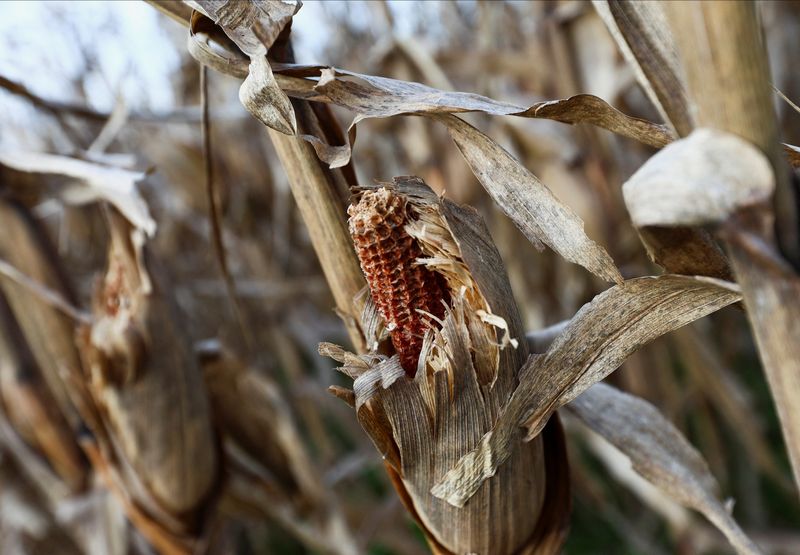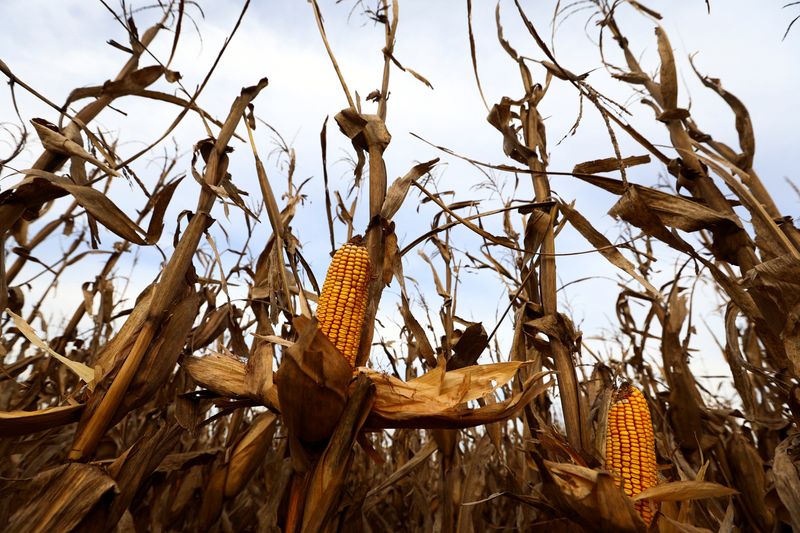By Maximilian Heath and Matias Baglietto
CORDOBA PROVINCE, Argentina (Reuters) - Global warming has brought Argentina's corn farmers a dangerous new enemy: a yellow insect just four millimeters (0.16 inch) long that thrives in hotter temperatures and is threatening harvests of the crop. Meet the leafhopper.
The world's No. 3 corn exporting country has slashed millions of tons from its harvest projections for the current crop due to a rare plague of the insect that can carry a stunt disease that damages the cobs and kernels of the plant.
Farmers fear such infestations could become more regular, with fewer frosts in recent years to check the insect's spread, and forecasts for a warm winter ahead, farmers, weather experts and data analyzed by Reuters showed.
Some farmers already have said they will sow less corn for next season in favor of other crops such as soy, the South American country's main cash crop, which is not affected by the bugs.
"Many are going to reduce their hectares of corn to zero," said Anibal Cordoba, a producer in northern Chaco province, adding a hard freeze this winter is needed or leafhopper numbers will explode again next season.
"You normally found leafhoppers in the bud of the plants if you looked. But this year you go to the field and you find clouds of leafhopper. It's just crazy."
Agriculture and climate experts linked the unusual outbreak to rising global and local temperatures.
"The number of days with frost is becoming less frequent due to global temperatures rising," said climate change specialist Matilde Rusticucci at the University of Buenos Aires, adding minimum temperatures in the country had "increased steadily".
"The year 2023 was declared the warmest year in history," Rusticucci said. This helped leafhoppers spread far beyond the warmer northern regions where they usually thrive and where farmers have adapted. Some 10 million tons of Argentine corn production has been lost already, and analysts say it could fall further.
"We should be talking about an Argentine production of more than 60 million tons of corn and because of this insect we are talking about 50.5 (million tons)," said Cristian Russo, head of agricultural estimates at the Rosario grains exchange (BCR).
"We all suspect that it still could get much worse than what we're seeing," he added. "It's a big blow to corn."
According to Russo, leafhopper numbers in northern Argentina are 10 times the normal level, while the insect has been found nearly 1,500 kilometers (932 miles) south of traditional areas, where previously it had been too cold.
Argentina's government, which did not respond to a request for comment on this story, has looked to speed authorization for pesticides to fight leafhoppers and recently met with farm associations to coordinate how to mitigate leafhopper damage.
'THIS IS A REAL, REAL PROBLEM'
In parts of Argentina, frosts have actually increased in recent winters, but some key farming areas have had a substantial decline. Nationally, minimum temperatures have been rising and cold nights decreasing over decades.
A study by scientists at Argentine universities and state institutes showed that from 1963 to 2013 the average number of cold nights decreased from 15 days per year to around eight.
Fewer frosty nights help leafhoppers, which cannot tolerate temperatures below 4 degrees Celsius, said Fernando Flores, entomologist at the National Institute of Agricultural Technology (INTA).
"One of the most important causes of the big increase in (insect) numbers was the decrease in the number of frosts in the country the previous winter," Flores said.
In western central Cordoba province, the main corn region of Argentina, the provincial grain exchange has estimated leafhopper-related corn losses of $1.13 billion. Data from the Cordoba observatory show frosts down steadily over decades.
"What was planted late towards the end of December, beginning of January, was where the greatest damage was seen," said Ramón Garcia, a farmer from the Cordoba farm town of Marcos Juarez. "There was a significant drop in yield."
The outlook ahead is tough. Rusticucci said January, February and March 2024 already set records for global maximum temperatures.
Michael Cordonnier, Illinois-based agronomist at consultancy Soybean and Corn Advisor Inc, said what had happened with corn in Argentina was "very unusual" and it would take time for farmers there to adapt, as farmers in warmer corn-growing areas like Brazil have adapted over years.

"This is a real, real problem. Going forward, they will be able to solve this a few years down the road by getting hybrids that are more tolerant to corn stunt disease and registering more insecticides for this specific problem," he said.
"But for the time being it's just terrible."
